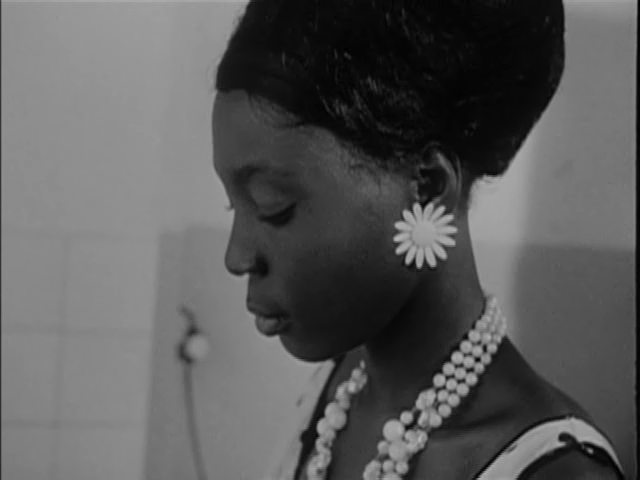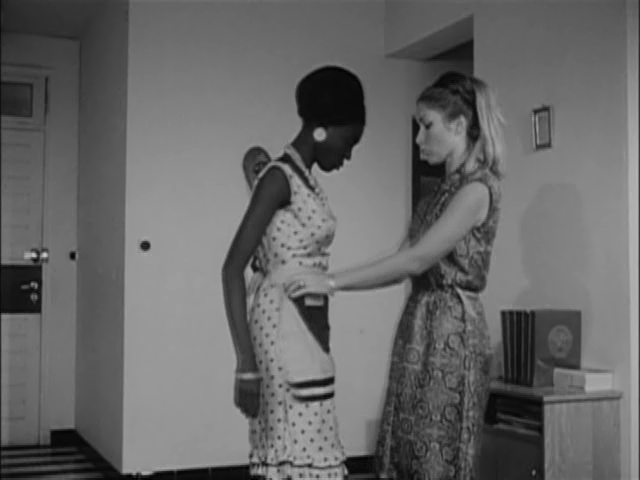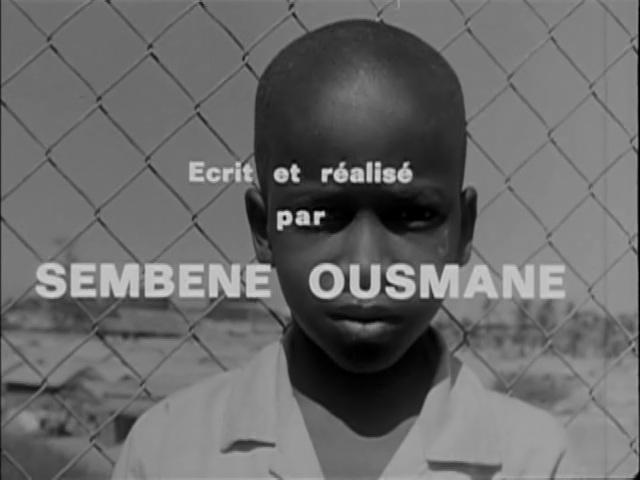Gran parte de la info es de Joao Paulo en 24fps
La Noire de...
Black Girl
Chica negra

Ousmane Sembene
Producción: Les Films Domirev, Actualités françaises
Guión: Sembene Ousmane
Fotografía: Christian Lacoste
Música: Air populaire sénégalais
Montaje: André Gaudier
Reparto:
Mbissine Thérèse Diop ... Diouana
Anne-Marie Jelinek ... Madame (as Anne-Marie Jelinck)
Robert Fontaine ... Monsieur
Momar Nar Sene ... Diouana's Boyfriend
Ibrahima Boy ... Boy with Mask
Bernard Delbard ... Young Male Guest
Nicole Donati ... Young Female Guest
Sinopsis: En Dakar, Diouana, analfabeta, es contratada por una pareja de blancos burgueses. Está encargada de ocuparse de los niños, una responsabilidad que la hace tener en cuenta por sus semejantes… Para agradecerle esta situación acomodada, Diouana le ofrece una máscara tradicional a su jefa. Por petición de sus patrones, Diouana acepta con júbilo acompañarlos a Antibes para las vacaciones. En Francia, las cosas cambian. Diouana se ve en la obligación de realizar todas las tareas domésticas, reducida así a la servidumbre sin ningún día de descanso...
Eric Henderson escribió:In Movies as Politics, Jonathan Rosenbaum makes a case for Senegal writer-director Ousmane Sembene's Black Girl as the symbolic genesis of sub-Saharan African filmmaking, at least to the extent that the authorship belonged to a born and bred African and not a well-meaning European ethnographer like, for instance, the extraordinary Moi, un noir's Jean Rouch. Based on one of his own anti-colonialist stories, Sembene's film begins with the arrival of Diouana, a stylish young black woman, to the French Riviera. Giddy on dreams of attaining true cosmopolitanism, Diouana has accepted a job as a domestic to a diffident married couple. In Senegal, she was a nanny to their children. But once she arrives in France and gets set to sweep floors, scrub bathtubs, and prepare spice-free versions of her homeland cuisine for houseguests (the couple's kids apparently study abroad), she comes to the slow realization that her employees are more like masters and her domestic position is really just paid slavery.
Though nominally free in the sense that she isn't locked up in her masters' apartment, Diouana's illiteracy and plummeting sense of vocational self-worth quickly lead her into a spiral of depression. She tries to hold onto a sliver of hope, wearing glamorous spike heels while she does her housework and reminding herself repeatedly that soon the kids will come back and her house chores will stop. But Diouana's boss, a malcontent, snippy housewife, demands Diouana remove her flashy footwear (in a clear fit of class vengeance), and the kids' arrival continues to loom in the distance. Diouana's situation is obviously tragic, but Sembene's ability to match his contempt for so-called "decolonization" with a non-judgmental eye toward all his characters defuses any danger of slipping into polemics. Diouana's excitement over her move to France is not, surprisingly, in anticipation of her future paychecks. Instead, her ambitions are downright shallow: she can't wait to use her wages to buy dresses so that she can take pictures of herself living posh and send them to her friends and relatives back home in hope that her success will throw them into paroxysms of jealousy.
Decolonization in Black Girl is not only a myth, but also a myth that actually strengthens the consumerist caste systems. The frustrated (and unnamed) middle-class housewife, who can't chide her droopy-dog husband to lift an eyebrow, isn't a monster in any unequivocal sense. Her outrage is a byproduct of the expectations that the economic exploitation of France's African imperialism have given her. And when her husband returns to Senegal to pay a guilt-ridden visit to Diouana's estranged relatives, the presumptuousness of his attempts to fix his mistakes by dropping cash is obviously callous, but it's all he knows. The mask-wearing boy who follows him out of town silently suggests the caveat emptor of a culture that the husband's nation tried to buy, but misplaced the receipt.
File Name .............: OusmaneSembene-BlackGirl-1966.avi
File Size (in bytes) ..: 638,873,600 bytes
Runtime (# of frames) .: 00:55:36 (99991 frames)
Video Codec ...........: XviD
Frame Size ............: 640x480 ()[=] [=1.333]
FPS ...................: 29.971
Video Bitrate .........: 1396 kb/s
Bits per Pixel ........: 0.152 bpp
B-VOP, N-VOP, QPel, GMC ......:[B-VOP]...[]...[]...[]
Audio Codec ...........: 0x0055(MP3, ISO) MPEG-1 Layer 3
Sample Rate ...........: 48000 Hz
Audio bitrate .........: 128 kb/s [2 channel(s)]CBR audio
Interleave ............: 33 ms
No. of audio streams ..: 1



Película:
Subtítulos:
Castellano:
Traducidos por joao paulo para veinticuatrofps
Inglés: